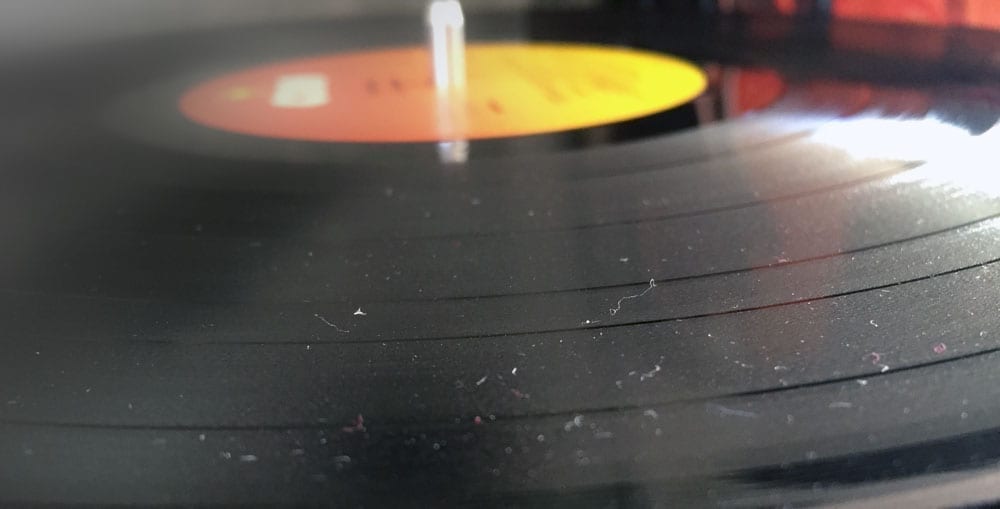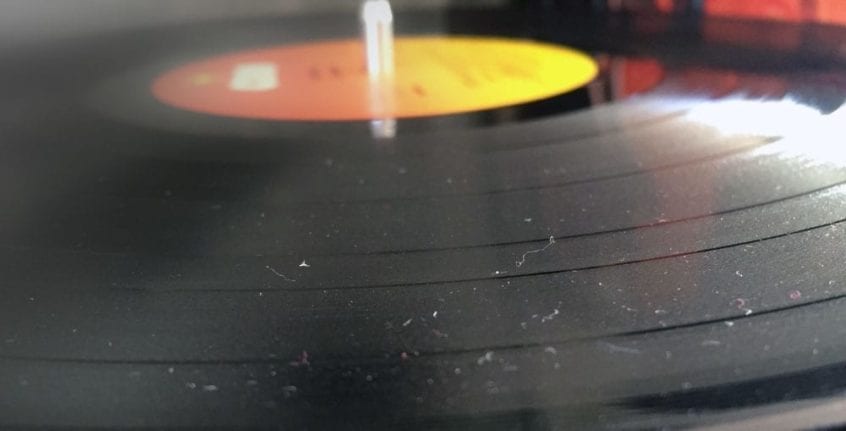John Peel’s famous surface noise quote is held up as capturing perfectly the sentiment behind vinyl’s unlikely revival in the digital age. Digital music production and playback has allowed us to clean up the noise of analog tape and production techniques to a level of perfection never thought possible throughout most of the 20th century. In many cases, electronic musicians are able to produce entirely digital albums from start to finish, without a single instrument or element of the production process touching the real world. But if perfection is what we’ve been striving for, why is a format with inherent surface noise and imperfect analog coloration of sound selling at a 30-year high?

The answer, perhaps, could lie within our own sense of reality. To quote a line from the Matrix, “…the first Matrix was designed to be a perfect human world, where none suffered, where everyone would be happy? It was a disaster. No one would accept the program, entire crops were lost.”
My point is quite simple. While digital audio offers a level of perfection undoubtedly beyond what vinyl can deliver, absolute clean perfection might not be what we actually want.
If we take the example of albums recorded entirely in the digital domain, we see plenty of evidence to suggest that absolutely clean digital audio can leave us wanting. Producers, both amateur and professional, often talk of the struggle to get each individual instrument or tracks to “sit in the mix” when working entirely in the digital domain. So much so that engineers will often deliberately introduce noise into a recording, or apply analog noise emulation to simulate recording with tape. Besides the added noise floor, there are also compression side-effects from tape recording that can help to tame very bright, transient audio, which can otherwise be difficult to tuck into a mix. For this reason, you will frequently hear recording engineers describe tape hiss and compression as the glue that holds the recording together.
This isn’t even an analog versus digital argument, it’s more a case of perfect versus imperfect. Audio quality will always carry a degree of subjectivity, and the analog vs digital debate will undoubtedly carry on in audiophile circles for many years to come. What I’m making a case for is the beauty in imperfection, whether that be digital or analog – although in many instances analog’s inherent noise can help.
We can draw very similar comparisons from architecture. For example, an old building constructed from traditional clay bricks or natural stone features an almost infinite amount of tiny variations that you could call imperfections. These many irregularities in natural materials mean that the building is not technically perfect; you could build the same house five times from exactly the same materials, and no two houses would be the same. Modern bricks take advantage of more consistent man-made materials that are technically more “perfect” and easier to manufacture consistently, but in doing so, we lose the many irregularities that make up the character and charm of a building. Taking a similar example from my wife’s industry (jewelry), if you were to compare two diamonds side-by-side (one “perfect” on paper and the other with some inclusions/imperfections), you’ll often find that the less “perfect” diamond has more character and fire. The inclusions, like imperfections in audio or construction materials, can add a quality that cannot be quantified.
“Somebody was trying to tell me that CDs are better than vinyl because they don’t have any surface noise. I said, “Listen, mate, life has surface noise.” – John Peel
As many Sound Matters readers will likely agree, a properly produced and mastered record – manufactured to the highest standards – is one of the best possible audiophile experiences. Arguably, however, the many tiny imperfections of analog playback contribute to the overall enjoyment. When listeners claim they prefer the “warmth” of vinyl, they are most likely describing the sound of many subtle distortions imparted by analog playback.
Good noise is a fine line, of course, and the point at which distortion or surface noise becomes distracting or undesirable will be different from one person to the next. And while surface noise from dust and dirt is best kept to a minimum for the sake of fidelity and longevity, I have come across plenty of more casual vinyl collectors that surprise me in their love of crackles and pops as part and parcel of the whole vinyl experience. Even I find that old jazz records, in particular, lend themselves to this aesthetic. Bad for your stylus it might be, but there is a strong argument for the comforting atmosphere of warm, crackly old records. (Within reason; most of us would draw the line at deep scratches and records that skip!)
Increasing numbers of us are craving something that feels real. Our lives are increasingly detached from the beauty and raw quality of the real world. We now spend an average of over four hours a day on own mobile devices. That’s a heck of a lot of time, and it’s now widely understood that too much screen time can be bad for our mental health and productivity. Far from a mere nostalgia trip, the noise of vinyl records, in my opinion, can help us to reconnect with our sense of reality. Life, after all, isn’t perfect; life has ups and downs and distractions. “Surface noise,” as John Peel put it, is all around us, but without it, we lose authenticity. If there is no dark, there can be no light.




[…] Surface noise on brand new wax is another common complaint. In many circumstances, you should be able to fix this one yourself by wet cleaning the vinyl, either by hand or using a record cleaning machine. In fact, as a matter of good practice, I wet clean all my new vinyl before the first play. In many cases, new records come contaminated straight from the factory and usually benefit from a light clean. If wet cleaning doesn’t clear things up, you could have a bad pressing. Arguably, you can put some surface noise down as just the nature of the beast, but heavy surface noise on a new record is clearly unacceptable. How much is too much? Well, that depends on who you ask. […]
I think digital could sound better…it’s all down to mastering …..I’m trying out vinyl but fear I may have to stop as it’s getting expensive….Also I find or realise some new re masters git surface noise which winds me up….I bought copy of Beatles re mix sgt peppers and prefer the cd version….
Marc,
Being I was taught on how to handle & care for records at an early age, my collection as a child is still in good condition. The first record ever purchased was back in 1972. I don’t mind a pop/ snap or two between songs, but I do mind hearing that noise during a song. I was instructed by my father back in the day, “place the needle (stylus) on the record and leave it there”.
I do hear the differences between analog and digital. I have listened to Whitney Houston’s “Greatest Love OF All” on CD for many years. Then, just recently, I had the opportunity to hear it on vinyl. I was completely surprised. The detail of the piano was so much greater than what I experienced on CD.
We do have an issue with newly released and re-released records. The problem lies with the pressing. I have purchased new records, and there are pits embedded in the lacquer. Naturally, this will cause quite a bit of surface noise, not accounting for the stress being applied to the stylus. Considering where were are technologically, this is unacceptable.
Thanks Jonathan. Always good to hear the experience of listeners. Taking care of your records always comes first, that’s for certain. I’d never let any of my collection become dirty and noisy on purpose, but I don’t mind a little ‘character’ here and there.
100% agree on the issue of new pressings. There are lots of great new records, but far too many with quality control issues! The mastering in some cases can cause issues too. Thanks for reading.
I hate surface surface noise, always have done since I started LP listening in the 70s. So much so that, where it has driven me to distraction, in the past buying new copies of LPs and giving away my affected copies. These days it’s not an issue as I clean as I go.
I love the sound of analogue, without a doubt, for all its severe limitations and greater expense I still buy new LPs. However, having limited storage for only 2,000 LPs, I have long since transitioned to digital files.
I now say this with trepidation (fight)………
Modern digital recordings can sound far better than anything produced in the analogue domain. Especially on a half decent system.
I have A/B blind tested with many a recording to conclude this.
And yet despite every fibre of my logical mind screaming the superiority of digital …. I still but vinyl. My family doesn’t understand it either.
You work it out!!!!!
Hey! Great story and contribution – thanks for sharing. You’re quite right about modern digital, it’s undoubtedly very good (ask a mastering engineer and they’ll no doubt say the same). Despite this, the lure of analogue continues, which I find fascinating, but also not surprising. However you choose to listen, enjoy the music 🙂
An Interesting article Marc, I had almost convinced myself that surface noise was a desirable addition to any record and could listen to my back catalogue with renewed joy and delight. Then I bought a new copy of Bob Dylan’s recent album”Fallen Angels”, beautifully cut or pressed or whatever it is that makes the sound bright and “in the room” and no surface clicks and pops whatsoever. Am I to feel cheated? Should I return the record to the shop? or should I just accept that no noise is a much better sound and therefore any attempt to convince ourselves otherwise is an attempt at appeasement for our much loved old records and an excuse not to throw them out. An excuse which I am still happy to share and encompass…I can still just about hear Paul McCartney’s voice on my mono copy of The Beatles White Album over and above the scratches, clicks and pops.
Thanks Ross. No, you shouldn’t feel cheated; a well-made new record is work of art and I bet that pressing sounds great! To be clear, this article is not an advocate for dirty records. If anything, a great deal of our content focuses on how to clean vinyl records.
This article is more of an observation that vinyl’s flaws and imperfections can often add something to the experience. Clearly the line at which this crosses from characterful to distracting and annoying will be different from one person to the next. Happy listening 🙂